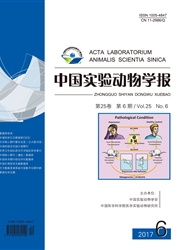

 中文摘要:
中文摘要:
目的探讨阿霉素肾病大鼠疾病进展过程中尿液糖胺聚糖含量的变化及其与尿蛋白的关系。方法采用一次性尾静脉注射阿霉素6mg/kg制作肾病综合征大鼠模型,第1、2、3、4、6周分别收集大鼠24h尿液测定尿糖胺聚糖和尿蛋白含量。43d后结束实验取血及肾脏,检测血生化,观察肾组织病理改变。结果第2、3、4、6周与正常对照组比较,阿霉素肾病大鼠24h尿蛋白排泄量呈进行性明显上升趋势;造模43d后模型组血清白蛋白含量显著下降,总胆固醇和甘油三酯含量显著升高,肾组织病理所见,模型组肾小球系膜区见中度至重度的系膜细胞增殖及基质增生。从第3周开始阿霉素肾病大鼠尿糖胺聚糖浓度显著高于正常组,且与24h尿蛋白排泄量呈正相关关系。第6周尿糖胺聚糖浓度与血清白蛋白浓度负相关,与甘油三酯浓度正相关。结论阿霉素肾病综合征大鼠尿液中糖胺聚糖浓度升高,并与24h尿蛋白排泄、血清白蛋白、甘油三酯浓度显著相关。
 英文摘要:
英文摘要:
Objective To investigate the concentration of urinary glycosaminoglycans and its correlation with the proteinuria in adriamycin-induced nephrotic rats.Methods Twenty Wistar rats were randomly divided into normal control group and model group.The rat nephrotic models were induced by adriamycin 6 mg /Kg i.v.injection.The proteins and glycosaminoglycans concentrations of 24-hour urine excretion were measured at the 1st,2nd,3rd,4th,and 6th week,respectively.The rats were then sacrificed after 43 days of insult,and the blood and kidneys were harvested for serum albumin and histopathological examination.Results Compared with the normal control group,the levels of 24 hours urinary proteins at the 2nd,3rd,4th,and 6th week increased progressively.At the ending of the test,the level of serum albumin was significantly decreased and the level of total cholesterol and triglyeride increased significantly.The pathological examination revealed moderate to severe proliferation of glomerular mesangial cells and expansion of mesangial matrix in the rat kidneys of model group.The concentrations of urinary glycosaminoglycans were significantly increased from the 3rd week and were positively correlated with the 24 hours excretion of urinary protein.The concentration of urinary glycosaminoglycans at the 6th week was negatively correlated to the serum albumin,and positively correlated to the triglyceride.Conclusions In the rats with adriamycin-induced nephritic syndrome,the concentration of urinary glycosaminoglycans is increased,and it is significantly correlated with the increase of excretion of 24-hour urinal protein and the concentration of triglyceride,and the decrease of serum albumin.The reduction of glycosaminoglycans in glomerular basement membrane may be an important factor for the increased excretion of urinary protein.
 同期刊论文项目
同期刊论文项目
 同项目期刊论文
同项目期刊论文
 期刊信息
期刊信息
